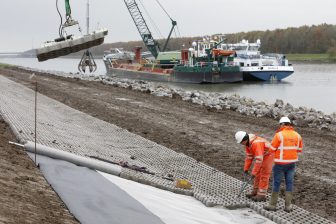EC takes stock of the GALILEO Programme
Brussels, Belgium – The European Commission today adopted a communication taking stock of the GALILEO satellite radionavigation programme. The communication outlines the key components of this ambitious European project and includes an updated timetable for its implementation. It will be forwarded to the European Parliament, the Council, the Economic and Social Council and the Committee of the Regions.
“GALILEO is perfectly in line with the Lisbon growth strategy. It is the largest industrial project ever organised on a European scale, the first European public-private partnership, the first European public infrastructure. The project will generate jobs as well as innovation and improvement for European citizens”, said Commission Vice-President Jacques Barrot.
As of 2010, the 30 satellites in the planned constellation will provide optimum coverage throughout the world, offering positioning accuracy to within approximately a metre. The range of the five GALILEO services¹ will be capable of meeting the needs of all potential users, wherever they may be in the world.
The communication goes on to examine the main elements of the programme:
- The installation of the space and ground infrastructure began on 28 December 2005 with the launch of the first experimental satellite, GIOVE A.
- Since the beginning of 2006, negotiations for the system concession contract have entered a decisive phase. The candidate for the concession is a consortium with the following eight members: Aena (ES), Alcatel (FR), EADS (FR/D), Finmeccanica (I), Hispasat (ES), Inmarsat (UK), Thales (FR) and TeleOp (D). The critical aspects of the negotiations should be decided by the end of the year. This will be followed by the procedure of budgetary authority approval and financial verification (“due diligence”). The contract is expected to be finalised in the course of 2007.
- The Supervisory Authority, the European agency tasked with managing the public interests connected with the European GNSS programmes and acting as regulatory authority for them, is being set up quickly. It is located – for the time being – in Brussels. A number of Member States have already expressed interest in hosting the Authority.
- The Commission has also proposed that the activities of the GALILEO Joint Undertaking be transferred to the Supervisory Authority and that the Joint Undertaking should wind up its operations by 31 December 2006. Procedures to do so are under way.
- At the same time, the Commission is making ready for future GALILEO applications by actively undertaking research under European research and development programmes.
- The EGNOS system, which was the precursor to GALILEO, is now in operation and has successfully passed its first Operational Readiness Review.
- Of the five services offered by GALILEO, the Public Regulated Service (PRS or governmental service) is restricted to the use of European Union or Member State public bodies. Access to the service is restricted for security reasons. The policy on access to the PRS service is currently being drawn up.
- The Commission is also committed to promoting the use of satellite radionavigation. At the end of the year it is to present a Green Paper on GALILEO applications. A number of European legislative texts have already recommended the use of satellite radionavigation in a variety of sectors.
- As far as programme funding is concerned, it is still too early to give a precise figure to the share to be borne by the Community budget. The exact amounts that will ultimately be fixed for the duration of the concession – a period of 20 years – will depend on the risk-sharing arrangements determined by the concession contract negotiations.
- International cooperation is an essential component of GALILEO, which is designed for worldwide use. Cooperation agreements have been concluded with China, Israel, the United States, Ukraine, India, Morocco and South Korea. Others are in preparation.
For further information on GALILEO, please consult the following web pages:
http://ec.europa.eu/dgs/energy_transport/galileo/index_en.htm,
http://www.esa.int/export/esaSA/navigation.html.
¹ The open service, commercial service , safety of life service, search and rescue service and PRS (public regulated service/governmental service).
U las zojuist één van de gratis premium artikelen
Onbeperkt lezen? Profiteer nu van de introductieaanbieding voor € 10,- per maand.
Bent u al abonnee?



